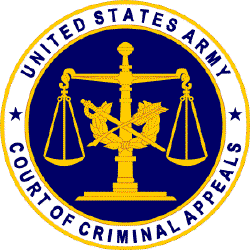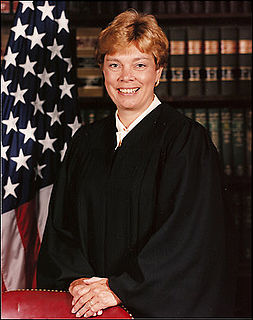
The secretary of the Navy is a statutory officer and the head of the Department of the Navy, a military department within the United States Department of Defense.
A court-martial or court martial is a military court or a trial conducted in such a court. A court-martial is empowered to determine the guilt of members of the armed forces subject to military law, and, if the defendant is found guilty, to decide upon punishment. In addition, courts-martial may be used to try prisoners of war for war crimes. The Geneva Conventions require that POWs who are on trial for war crimes be subject to the same procedures as would be the holding military's own forces. Finally, courts-martial can be convened for other purposes, such as dealing with violations of martial law, and can involve civilian defendants.
The Uniform Code of Military Justice is the foundation of military law in the United States. It was established by the United States Congress in accordance with the authority given by the United States Constitution in Article I, Section 8, which provides that "The Congress shall have Power....To make Rules for the Government and Regulation of the land and naval forces".
Military tribunals in the United States are military courts designed to judicially try members of enemy forces during wartime, operating outside the scope of conventional criminal and civil proceedings. The judges are military officers and fulfill the role of jurors. Military tribunals are distinct from courts-martial.

The United States Court of Appeals for the Armed Forces is an Article I court that exercises worldwide appellate jurisdiction over members of the United States Armed Forces on active duty and other persons subject to the Uniform Code of Military Justice. The court is composed of five civilian judges appointed for 15-year terms by the President of the United States with the advice and consent of the United States Senate. The court reviews decisions from the intermediate appellate courts of the services: the Army Court of Criminal Appeals, the Navy-Marine Corps Court of Criminal Appeals, the Coast Guard Court of Criminal Appeals, and the Air Force Court of Criminal Appeals.

The Judge Advocate General's Corps, also known as the "JAG Corps" or "JAG", is the legal arm of the United States Navy. Today, the corps consists of a worldwide organization of more than 730 commissioned officers serving as judge advocates, 30 limited duty officers (law), 500 enlisted members and nearly 275 civilian personnel, all serving under the direction of the Judge Advocate General of the Navy.

The Guantanamo military commissions were established by President George W. Bush – through a Military Order – on November 13, 2001, to try certain non-citizen terrorism suspects at the Guantanamo Bay prison. To date, there have been a total of eight convictions in the military commissions, six through plea agreements with the defendants. Several of the eight convictions have been overturned in whole or in part on appeal, mostly by U.S. federal courts.
An Article 32 hearing is a proceeding under the United States Uniform Code of Military Justice, similar to that of a preliminary hearing in civilian law. Its name is derived from UCMJ section VII Article 32, which mandates the hearing.
Courts-martial of the United States are trials conducted by the U.S. military or by state militaries. Most commonly, courts-martial are convened to try members of the U.S. military for criminal violations of the Uniform Code of Military Justice (UCMJ), which is the U.S. military's criminal code. However, they can also be convened for other purposes, including military tribunals and the enforcement of martial law in an occupied territory. Federal courts-martial are governed by the rules of procedure and evidence laid out in the Manual for Courts-Martial, which contains the Rules for Courts-Martial, Military Rules of Evidence, and other guidance. State courts-martial are governed according to the laws of the state concerned. The American Bar Association has issued a Model State Code of Military Justice, which has influenced the relevant laws and procedures in some states.
Hamdan v. Rumsfeld, 548 U.S. 557 (2006), is a case in which the Supreme Court of the United States held that military commissions set up by the Bush Administration to try detainees at Guantanamo Bay violated both the Uniform Code of Military Justice (UCMJ) and the Geneva Conventions ratified by the U.S.

Salim Ahmed Hamdan is a Yemeni man, captured during the invasion of Afghanistan, declared by the United States government to be an illegal enemy combatant and held as a detainee at Guantanamo Bay from 2002 to November 2008. He admits to being Osama bin Laden's personal driver and said he needed the money.
A United States military "jury" serves a function similar to an American civilian jury, but with several notable differences. Only a general court-martial or special court-martial includes members. There are no members in a trial by summary court-martial. If the defendant at a general or special court-martial chooses to be tried by members rather than by a military judge alone, the members are responsible for rendering both a verdict and sentence should the accused be found guilty. The charges are brought forward by an officer called a "convening authority", who also selects the members who try the accused. The charges are prosecuted by judge advocates called "trial counsel". Defendants facing general or special courts-martial are represented free of charge from judge advocates acting as defense counsel. Defendants may also be represented at general or special courts-martial by civilian attorneys hired at their own expense. While not required by Congressional law, service policy provides that, at summary courts-martial, many military accused receive representation from a judge advocate defense counsel free of charge.
The Navy-Marine Corps Court of Criminal Appeals (NMCCA) is the intermediate appellate court for criminal convictions in the United States Navy and the Marine Corps.

In the United States military, the Army Court of Criminal Appeals (ACCA) is an appellate court that reviews certain court martial convictions of Army personnel.

Susan Jean Crawford is an American lawyer, who was appointed the Convening Authority for the Guantanamo military commissions, on February 7, 2007. Secretary of Defense Robert Gates appointed Crawford to replace John D. Altenburg.

The Air Force Court of Criminal Appeals (AFCCA) is an independent appellate judicial body authorized by Congress and established by the Judge Advocate General of the Air Force pursuant to the exclusive authority under 10 U.S.C. § 866(a). The Court hears and decides appeals of United States Air Force court-martial convictions and appeals pendente lite. Its appellate judges are assigned to the Court by The Judge Advocate General. The Judge Advocate General instructs court-martial convening authorities to take action in accordance with the Court's decisions.
United States of America v. Technical Sergeant Eric P. Marcum, 60 M.J. 198 is a United States Court of Appeals for the Armed Forces (CAAF) decision which, among other issues, upheld Article 125 (Sodomy) of the Uniform Code of Military Justice against a facial substantive due process challenge, and ruled that the Supreme Court's decision in Lawrence v. Texas, 539 U.S. 558 (2003) applied in analyzing as-applied challenges. The decision is thus binding precedent on all courts-martial in determining if an Article 125 prosecution is constitutional.
The Judge Advocate General's Corps, also known as JAG or JAG Corps, is the military justice branch or specialty of the U.S. Air Force, Army, Coast Guard, Marine Corps and Navy. Officers serving in the JAG Corps are typically called judge advocates.

Vaughn A. Ary is a retired American major general and the former staff judge advocate to the Commandant of the Marine Corps and director of the United States Marine Corps Judge Advocate Division. He currently serves as the Director of the Office of International Affairs for the U.S. Department of Justice.
Unlawful command influence (UCI) is a legal concept within American military law. UCI occurs when a person bearing "the mantle of command authority" uses or appears to use that authority to influence the outcome of military judicial proceedings. Military commanders typically exert significant control over their units, but under the Uniform Code of Military Justice (UCMJ) a commander must take a detached, quasi-judicial stance towards certain disciplinary proceedings such as a court-martial. Outside of certain formal actions authorized by the UCMJ, a commander using their authority to influence the outcome of a court-martial commits UCI. If UCI has occurred, the results of a court-martial may be legally challenged and in some cases overturned.








